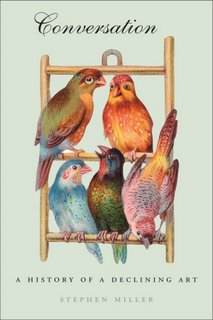Highly Recommended...Buy Now!

"Why should it matter to us today what Samuel Johnson said to Hester Thrale at a dinner party on an evening in London long ago? As Stephen Miller persuasively argues in his exploration of conversation and its discontents, it matters a good deal. For the 18th century was the golden age of raillery and wit, a time when conversation was practiced as an art. . . . Miller's engaging book is a good place to begin talking about what we think conversation is and should be over a latte, of course." - Barbara Sjoholm, Seattle Times
[A] charming (and alarming) history of conversation as elegantly affable as the conversationalists [Miller] admires. And the measure of his book is that it makes one want to rush out and converse about it. Four o'clock to seven; bring your wits. - Michael Bywater, The Independent
"In the sublime make of David Hume and Dr. Samuel Johnson, Stephen Miller gives us a celebration and elegy for the art of conversation. His work at once enlightens and saddens me, two effects that fuse into one." - Harold Bloom
Miller explores the conversation about conversation among such great writers as Cicero, Montaigne, Swift, Defoe, Lady Mary Wortley Montagu, and Virginia Woolf. He focuses on the world of British coffeehouses and clubs in "The Age of Conversation" and examines how this era ended. Turning his attention to the United States, the author traces a prolonged decline in the theory and practice of conversation from Benjamin Franklin through Hemingway to Dick Cheney. He cites our technology (iPods, cell phones, and video games) and our insistence on unguarded forthrightness as well as our fear of being judgmental as powerful forces that are likely to diminish the art of conversation.
<< Home